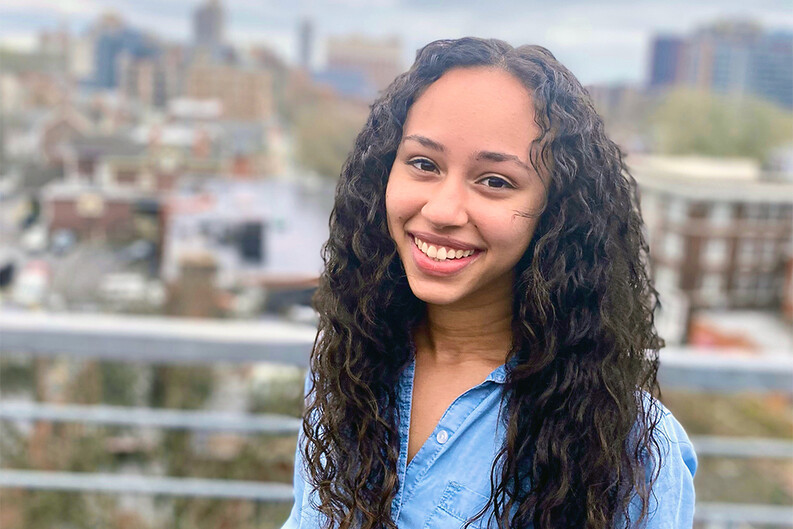Postgraduate Fellow Spotlight: Megan Pearson ’21

Megan Pearson ’21 reflects on her time so far as a Bernstein International Human Rights Fellow at Accountability Counsel’s Policy Team. Bernstein Fellowships are awarded to Yale Law School graduating students or recent graduates to devote a year to full-time advocacy human rights work.
What does your work with the Policy Team entail?
The Policy Team advocates for development finance institutions (DFIs) to improve their accountability to local communities who are negatively impacted by development projects. (Examples of DFIs include the World Bank, the International Finance Corporation, and the Inter-American Development Bank.) We advise DFIs about how to strengthen their independent accountability mechanisms (IAMs), which provide communities with a process for filing complaints and getting the DFIs to address environmental and social harms they’ve unintentionally supported through their funding.
What that looks like on a day-to-day basis for me is researching DFI policies and comparing them against best practice — I make a lot of spreadsheets — sharing recommendations during consultation calls with DFI staff, and coordinating with partner NGOs on advocacy strategy. I’ve also gotten to do some public-facing writing, like this blog post explaining one of our policy recommendations for making accountability mechanisms more accessible to project-affected communities.
Tell us about an interesting project you’ve worked on.
I’m very excited to be participating in Accountability Counsel’s remedy advocacy. The problem we’re trying to address is that even when communities go through a full complaint process and the DFI acknowledges that it contributed to harm, the communities rarely get an effective remedy — whether that’s compensation, restoration of livelihoods, or even an official apology. We are pushing for a shift in the way development banks think about accountability. Currently, banks tend to see their accountability mechanisms as tools to help them bring projects back into compliance with bank policies. But they need to go further. For banks to truly live up to their “do no harm” mandates, their accountability mechanisms must be part of a rights-based remedial framework that ensures communities are made whole when they experience harm. It’s a long-term push that will take lots of partnership with affected communities, accountability advocates, and the financial institutions themselves.
What are some of the challenges in helping international financial institutions make their accountability mechanisms more accessible and effective for impacted local communities?
A central challenge is that every financial institution has its own accountability mechanism with its own unique procedures. Every institution understands the role of its IAM slightly differently, and different institutions focus on different types of projects, with potential to cause different types of harm. It’s an interesting puzzle to figure out how each DFI can make its accountability office as effective as possible, while remaining customized to its particular focus and mandate.
And then there’s the challenge of ensuring that policy “wins” on paper are actually implemented. If a policy change doesn’t actually translate into improved outcomes for communities, then we haven’t had an impact. So monitoring implementation is also really important.
You have been pursuing research on the elusiveness of meaningful remedies for victims of environmental and human rights harms. What have you learned?
I’ve learned that DFIs frame potential environmental and human rights harms in terms of risk, and that they tend to focus on preventing or “minimizing” risks to the exclusion of planning how to remedy negative impacts when they inevitably occur.
Unfortunately, DFIs are very resistant to the idea of facilitating remedy for communities. They typically cite a fear that committing to remedy will expose them to increased legal liability. However, our research indicates that that’s likely an unfounded fear. For one thing, DFIs have very robust immunities that make it nearly impossible to sue them. Even in limited cases where DFIs are not immune, the legal hurdles to successfully bringing a claim against an international financial institution are formidable — political question and forum non conveniens doctrines, territorial nexus requirements, restrictive lender liability laws, and the substantive complexity of tort claims in the context of financing relationships, to name a few. In addition, the communities impacted by development projects are often very marginalized and have few resources. As a practical matter, it is much less costly and more efficient for them to go through an accountability mechanism process than to file a lawsuit against the DFI. So in reality, if DFIs provide effective and meaningful remedy through their accountability offices, the buck is likely to stop there.
What past experiences — at YLS or before — have motivated you to spend your fellowship at Accountability Counsel?
I’ve wanted to fight for the right to effective remedy since before law school. As someone with family and loved ones in Haiti, I have seen the devastation that well-intentioned development efforts can have. I’ve watched communities articulate clearly and forcefully what they need to be made whole, and I’ve watched international institutions fail to respond to those demands or insist that they know better what people need. It really flies in the face of the principle of human dignity that those institutions ostensibly exist to uphold.
What are some of your goals during your fellowship year?
My number one goal has been to learn as much about this field as I can. I didn’t know that independent accountability offices existed before last year. Now I’m really excited about their potential as sites for marginalized people to have their human rights vindicated, particularly in contexts where the local judicial system is ineffective or non-existent.


